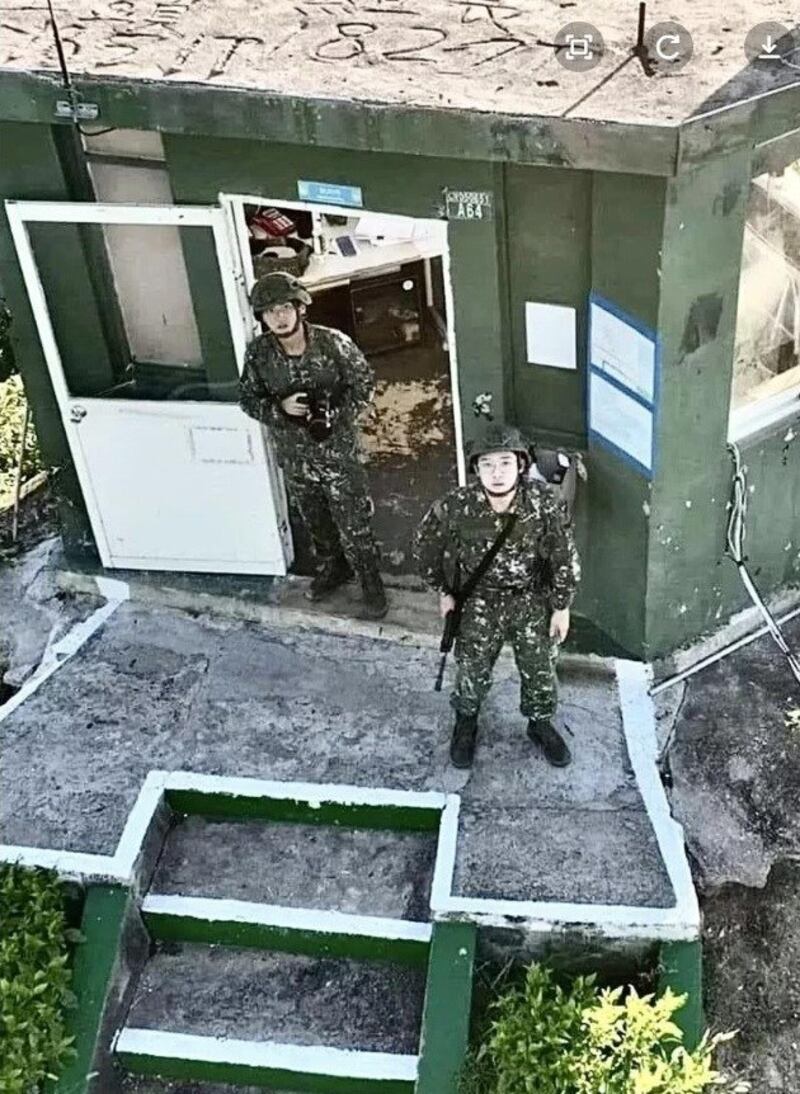Taiwan’s military will begin shooting down Chinese drones that intrude into the airspace of its outlying islands, the defense ministry in Taipei announced, while a White House National Security Council spokesman said the U.S. “will not accept” the new normal imposed by China in the Taiwan Strait.
Since mid-August, a number of civilian drones have been spotted flying over the outlying island of Kinmen, 180 kilometers (112 miles) from Taiwan’s main island but less than 10 kilometers (6 miles) from China.
On one occasion, on Aug. 16, two Taiwanese soldiers wearing masks were seen throwing rocks at a Chinese drone when it was flying above their military post.
The Kinmen Defense Command said two other Chinese drones were detected at Little Kinmen (Lieyu) island and nearby Lion (Shi) islet on Saturday and Monday respectively. The one that passed over Lion islet at around 4 p.m. was flying very low, only 30 meters from the ground, it said.
According to a statement on dealing with intruding drones from the Command on Sunday, troops are instructed to follow the procedure of "firing warning flares, reporting the incursion, expelling the drone, and ultimately shooting it down."

‘Uninvited thieves’
After the video clip from Aug. 16, deemed "highly embarrassing" by viewers, was posted on Chinese microblogging site Weibo, the Taiwanese defense ministry said a national drone defense system would be set up by 2023 and priority would be given to outer islands such as Kinmen.
While operating it, soldiers and officers “will continue to follow the principle of 'not to provoke conflicts and not to cause disputes' and will use technological equipment to take appropriate countermeasures,” the ministry said last Thursday.
The public has however called for more resolute measures.
“Regardless of whether the drone is civilian or military, as long as it enters the sensitive airspace, the army should first try to drive it away,” said Qi Leyi, a Taipei-based military analyst and commentator for RFA Mandarin.
“If that has no effect, the drone should be shot down,” Qi said.
The Chinese government has not said much about the drone incidents. When asked at a regular press briefing on Monday, Chinese Foreign Ministry's spokesman Zhao Lijian confirmed that he too has seen the videos.
“Chinese drones flying over China’s territory — what’s there to be surprised at?” Zhao said.
His comment provoked a furious response from the Taiwanese Foreign Ministry.
"There is an ancient Chinese teaching that 'uninvited people are called thieves',” it said in a statement.
“Whether it is breaking through the door or peeping from the air, the people of Taiwan do not welcome such thieves," the ministry said, accusing the Chinese Communist Party of being a “regional troublemaker” that has made “harassing other countries a daily routine.”
China ‘trying to turn up the temperature’
When asked about the Chinese drone incidents, White House National Security Council spokesman John Kirby declined to confirm them but said that Beijing continued to try to set a "new normal" for its activities toward Taiwan, Reuters reported.
The activities include sailing ships and flying aircraft across the unofficial median line in the Taiwan Strait.
"They're trying to turn up the temperature to a degree where it becomes sort of this new normal. We're not going to accept it," Kirby was quoted as saying.
In a possible tit-for-tat response by America for Chinese incursions, a Taiwanese media outlet said that unidentified U.S. military aircraft flew into China’s airspace on Aug. 28 and Aug. 29.
Liberty Times reported on Monday that the aircraft entered China's airspace adjacent to Taiwan on two consecutive days after crossing Taiwan's air defense identification zone (ADIZ).
An ADIZ is an area where foreign aircraft are tracked and identified before further entering into a country's airspace.
The newspaper said in the latest incident, that took place at around 8 a.m. on Monday, an unidentified U.S. aircraft was approaching Chinese airspace east of the Taiwan Strait when it received several warnings from the Chinese Air Force and eventually left after a brief entrance.
The news could not be verified as of Tuesday morning.
On Sunday two U.S. Ticonderoga-class guided-missile cruisers, the USS Antietam and USS Chancellorsville, made a “routine” transit through the Taiwan Strait.
Since the beginning of this year, American warships have conducted Taiwan Strait transits every month, apart from June when the U.S. Navy sent a P-8A Poseidon reconnaissance airplane through the Strait on June 24 instead.
The Biden administration plans to ask the U.S. Congress to approve an estimated $1.1 billion arms sale to Taiwan amid increasing tensions with China, according to Politico, a media website.
The arms sale would include 60 anti-ship missiles and 100 air-to-air missiles, Politico reported.
